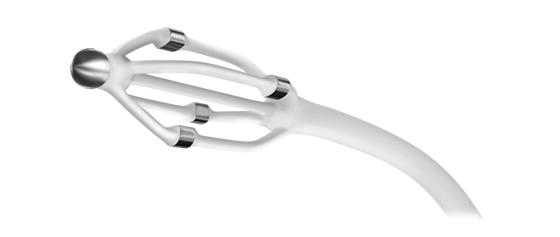
November 30, 2012 — St. Jude Medical Inc. announced that the company’s EnligHTN renal denervation system provides a safe, effective and sustained reduction in office and ambulatory blood pressure measurements at six months. The new data was released in the Clinical Science and Special Reports Session during the annual American Heart Association (AHA) meeting.
Renal denervation is a minimally invasive approach for the treatment of patients with drug-resistant hypertension. It is a specialized ablation procedure that targets nerves in the renal arteries leading to the kidneys that has been clinically proven to reduce blood pressure. A typical normal blood pressure is below 120 systolic (the first number) and 80 diastolic (the second number) and is expressed as 120/80 mmHg. Hypertension, or high blood pressure, is a blood pressure greater than 140/90 mmHg. The risk of cardiovascular death is cut in half with every 20 mmHg decrease in systolic blood pressure.
Patients enrolled in the EnligHTN I clinical study had an average blood pressure of 176/96 mmHg despite being treated with multiple medications to manage the condition. Those treated with the EnligHTN renal denervation system experienced an average rapid systolic blood pressure reduction of 28 mmHg points after 30 days.
At six months:
- An average systolic blood pressure reduction of 26 mmHg points was maintained;
- 76 percent of patients responded to the therapy and had an average office blood pressure of 150/86 mmHg; and
- There were no serious acute device- or therapy-specific adverse events reported.
“Managing blood pressure is a critical factor in maintaining the overall cardiovascular health of patients with drug-resistant hypertension,” said Dr. Vasilios Papademetriou, clinical associate-scientific collaborator from First Cardiology Clinic at Hippokration Hospital in Athens, Greece, and a coordinating study investigator who presented the data at the AHA meeting. “These results are important as they show that use of the EnligHTN multi-electrode renal denervation system can rapidly and safely decrease blood pressure, and the reduction is sustainable over time.”
A prospective, multicenter feasibility study, the EnligHTN I trial treated 46 patients whose blood pressure remained resistant despite being on three anti-hypertensive medications and a diuretic. To be considered for the study, patients were required to have a systolic blood pressure greater than or equal to 160 mmHg (150 mmHg for patients with type 2 diabetes).
“Renal denervation represents an important area of research in the management of hypertension for the millions of patients who live with this life-threatening condition,” said Frank J. Callaghan, president of the St. Jude Medical Cardiovascular and Ablation Technologies Division. “We are pleased with the rapid and sustained reduction of blood pressure to date and remain committed to advancing the science, technology and clinical evidence surrounding this important new procedure.”
For more information: www.visitsjm.com


 January 05, 2026
January 05, 2026 









